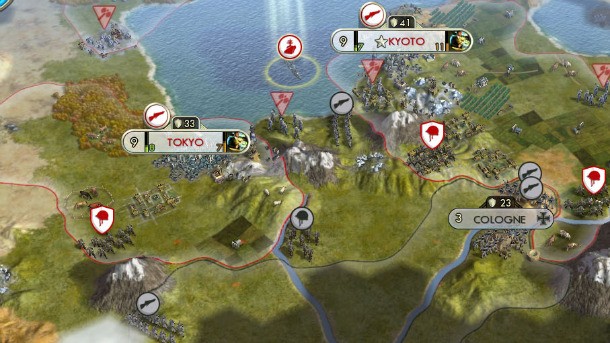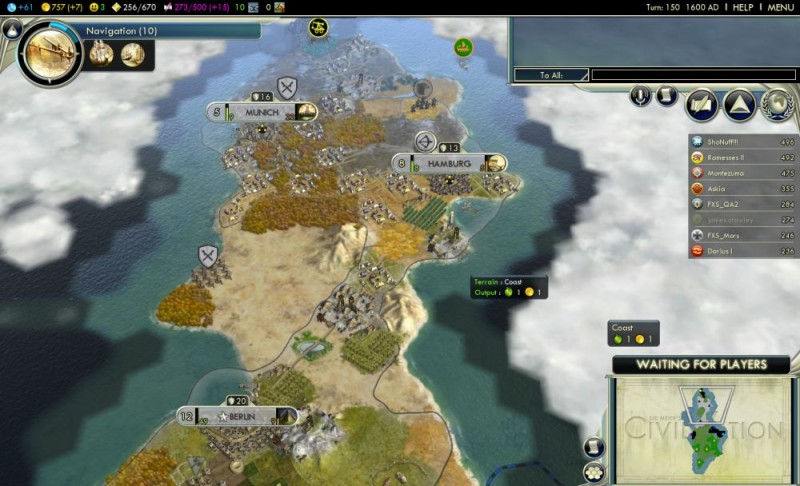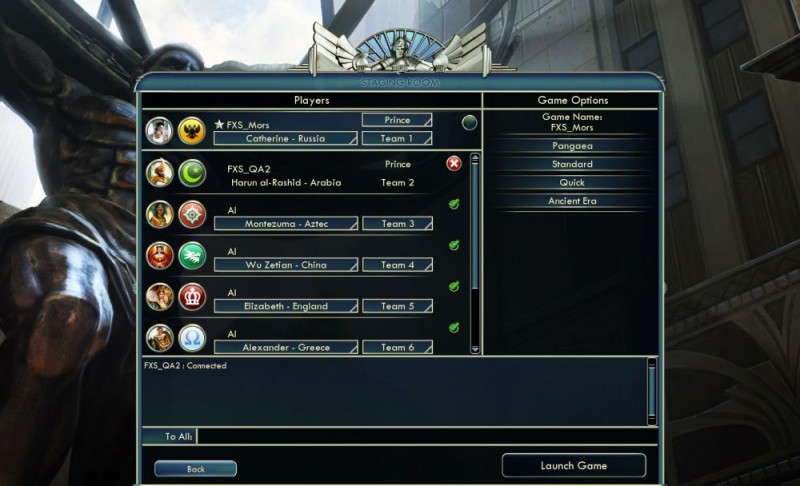Civilization V

Approaching multiplayer in a traditionally single-player game like Civilization is always tricky. Many of the game's mechanics don't work well in a multiplayer setting, but the idea of building rival empires against a human opponent or cooperating against unforgiving odds has a draw all its own. How well does Civ V handle this dilemma?
The most important thing about Civ V multiplayer is that it gives players the tools to play the game the way that they want to. I've got some issues with how the underlying game design handles the challenges of players playing full-bore to win against other players, but the wide variety of options means that you can set the game up to best fit your preferred style of playing Civ.
The default setting features simultaneous human play and a tight turn timer, which ends your turn by force if you let it run all the way down. The timer starts around 40 seconds, and lengthens as empires grow and managing them becomes more involved. This works fine in theory, and if nothing else it absolutely keeps the game jumping. The difference between having the timer on or off is like the difference between chess and speed chess. It works okay in Civ V, but not as well as in Civilization Revolution – Civ V is a deeper game with more to do, and the timer is a lot more binding here.
Civ V is not the most slickly engineered title I've ever played, and the added burden of simultaneous player turns taxes the game engine even further. I'm hopeful that some optimizations will occur before launch, but right now it's a little slow. Problems arise when the game's uneven performance costs you a move.

The worst consequences are mitigated – fail to assign a new research project and the unallocated science goes into limbo until you pick a new direction for research, so it's not totally lost. Missing out on a move is brutal when you're waging a military campaign, though, as positioning is critical in the new combat design. It only takes one such occurrence to make the game feel unfair.
Another issue with playing cutthroat Civ V is that early all-in strategies are almost impossible to counter without going all in yourself. This is partially due to the relative shrinking of the world since unit movement speeds are so much higher than in previous Civilizations. I've generally been on the winning side of this situation (what can I say, I like conquest!), but it doesn't make for a very fulfilling strategy game when it's all decided on the Prisoner's Dilemma. Without playing Archipelago maps that forcibly segregate players across water from each other, the following set of situations plays out too often:
- Player A rushes an early military strategy. Player B plays a typical early expansion game. A conquers B, giving A an enormous boost along the development curve.
- Both Player A and Player B rush early warfare, resulting in a brutal war of attrition that leaves both nations weakened and behind their rivals.
- Neither player rushes and they play nice together. At least until someone gets antsy and starts cranking out an army.
I'm just not convinced that Civ V is cut out to be a good competitive multiplayer game any more than previous iterations of the franchise, and possibly less so due to the relative ease of rushing. It's cool that Firaxis is supporting it as far as they are for people who are into it, and I'm not going to hate too much since it's only a small portion of the overall game, but I don't see this as a destination mode for any but a small handful of players.

Conversely, as a cooperative experience with people you know, Civ V multiplayer can be excellent. The ruleset can be tweaked extensively, allowing unlimited time for turns and customizing things like permanent alliances and allowed victory conditions. Co-op is a great way to learn how to tackle higher difficulties; the AI players speed up their development along the power curve significantly as the difficulty setting goes higher, and learning how to deal with that is a big part of success in Civilization.
Unlike competition, cooperation plays to Civilization V's strengths. Civ is ultimately a game about building things up, not tearing them down. Building stuff with friends, complementing each others' strategies, can be a fantastic experience. None of my complaints about Civ V competitive play carry over to co-op or friendly play. As long as the game lets me play the way I want, with the people I want to, I'll call the online portion a success.

Get the Game Informer Print Edition!
Explore your favorite games in premium print format, delivered to your door.
- 10 issues per year
- Only $4.80 per issue
- Full digital magazine archive access
- Since 1991










